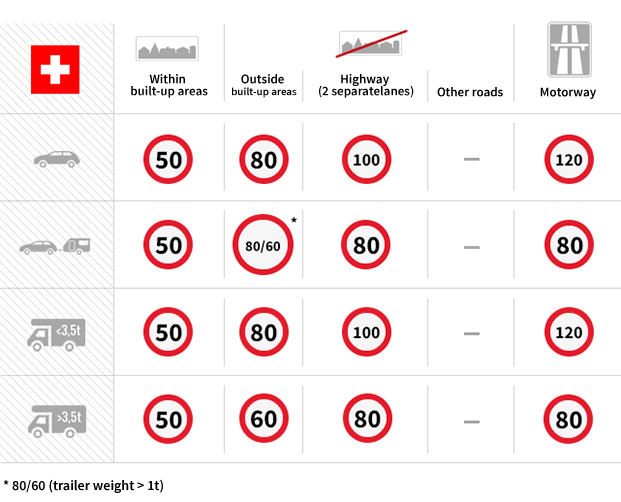Speed limits in Switzerland

Mandatory vehicle equipment in Switzerland
Vest
No special regulations
First Aid kit
Recommended
Warning triangle
Required
Fire extinguisher
Recommended
Minimum tire tread height
1.6mm (summer tires); 4mm (winter tires)
Winter tires
No special recipes but the driver who hinders movement due to its unfavorable to weather conditions is punished by a mandate
Studded tires
Allowed on all wheels from November 1 to April 30 (a foreign registration vehicle may use tires spoken in Switzerland, only if the regulations of the registration country permit)
Snow chains
Allowed if the snow or ice layer is on the road, the obligation to use on the road where the marking orders
Car with a caravan
The obligation to have additional side mirrors (if the trailer is wider than the towing vehicle), additional warning triangle
Light bulbs
No special regulations
Spare tire
No special regulations
Tow rope
No special regulations
Other legal restrictions in Switzerland
Legal alcohol limit
0.5 ‰
Driving with the dipped beam headlamps on
Mandatory around the clock all year round
Driving in seat belts
YES
Carriage of children
Children aged up to 12 years old and height up to 150cm must be transported in special seats or elevations. There is a ban on the carriage of children under 7 on the front seats.
Wild camping regulations
It allows accommodation on motorway parking lots, streets and squares. Always be careful for regional restrictions and best to ask the local population or such prohibitions do not occur
Tolls in Switzerland
To navigate roads in Switzerland, you should buy a vignette. The cost of vignettes for vehicles up to 3.5t is 40 CHF and is valid from December 1 by the previous year to 31 January of the following year (14 months). Vehicles with a trailer are obliged to have 2 vignettes, separately for the vehicle and separately on the trailer. Drivers of vehicles (other than trade) weighing above 3.5t are obliged to purchase other vignettes accordingly, depending on the weight and category of the vehicle. Additionally, there are tunnel journeys.
The data on this website is for informational purposes only. If in any doubt, remember that the road traffic regulations in your country always take precedence. The portal is not responsible for the consequences of using the information provided here.
The Vienna Convention on Road Traffic, which many countries have signed, sets out only the minimum characteristics of motor vehicles and trailers involved in international traffic. At the same time, it allows a given country to expand and tighten its requirements for vehicles traveling on their roads, so it is worth checking before leaving what additional equipment of the vehicle is in force in a given country to avoid unnecessary discussions with the police about the Vienna Convention.
We have created the CampRest portal for people who value freedom and travel on their own.
